- Home
- Johnny D. Boggs
South by Southwest
South by Southwest Read online
Copyright © 2011 by Johnny D. Boggs
First Skyhorse Publishing edition published 2015 by arrangement with Golden West Literary Agency
All rights reserved. No part of this book may be reproduced in any manner without the express written consent of the publisher, except in the case of brief excerpts in critical reviews or articles. All inquiries should be addressed to Skyhorse Publishing, 307 West 36th Street, 11th Floor, New York, NY 10018.
Skyhorse Publishing books may be purchased in bulk at special discounts for sales promotion, corporate gifts, fund-raising, or educational purposes. Special editions can also be created to specifications. For details, contact the Special Sales Department, Skyhorse Publishing, 307 West 36th Street, 11th Floor, New York, NY 10018 or [email protected].
Skyhorse® and Skyhorse Publishing® are registered trademarks of Skyhorse Publishing, Inc.®, a Delaware corporation.
Visit our website at www.skyhorsepublishing.com.
10 9 8 7 6 5 4 3 2 1
Library of Congress Cataloging-in-Publication Data is available on file.
Cover design by Brian Peterson
Print ISBN: 978-1-63450-432-4
Ebook ISBN: 978-1-5107-0042-0
Printed in the United States of America
For the Cub Scouts of Pack 414
Prologue
The wind blows hard in West Texas. Hard and, surprisingly, warm, reminding Zeb Hogan that it’s spring, practically summer.
He’s standing in a graveyard, overlooking a tombstone. Not much of one, really, just a wooden plank, with a name and year carved in it, already beginning to fade, to wither away.
Beside him stands the man he has sworn to kill, the man he has traveled across six war-ravaged states to murder.
Yet he turns away from the grave, away from the man, looks across the boneyard at a black boy. No, not a boy. No more. A black man, Ebenezer Chase, who is staring at Zeb Hogan, anxious, waiting. Ebenezer Chase’s journey has ended here, too.
Young Zeb Hogan faces the grave marker again. Beside him, the man is saying something, but Hogan can’t hear him. His mind has wandered, back to another graveyard, four months and more than a thousand long, arduous miles earlier, back to where the journey of Zeb Hogan and Ebenezer Chase began.
At the edge of the cemetery, Ebenezer Chase is also remembering . . .
Chapter One
The only way to escape the purgatory that was the Florence Stockade was to die. So on February 3, 1865, Zebulon Nathaniel Hogan, age fifteen years, four months, four days, died.
Corporal Favour and Private Gardenhire, the only two soldiers of the 16th Wisconsin healthy enough to tote Zeb’s wasted-away ninety pounds, wrapped him in a dirty, stinking, damp blanket too holey to keep out the biting wind, and carried him to the Dead House.
“Got another corpse, Harry,” a cracker voice said as Favour and Gardenhire laid Zeb on the floor. A weary sigh followed, and Zeb heard boots clopping on the wooden floor, knee joints popping, and heavy breathing. Zeb’s heart pounded so hard, he felt sure that the Johnny Reb could see the blanket trembling. He tried to steady his nerves, but couldn’t, when suddenly someone ripped the blanket off his face. The warmth of a lantern shone on him, and he did his best not to move his closed eyes.
“Land sakes,” the Reb’s voice said, “it’s the kid.”
“Yes. It is.” Favour’s voice cracked from nerves, but the Reb figured the Yankee corporal’s voice broke because a pal, a kid at that, had died. “’Twas the typhoid pneumonia that got him.”
From a corner of the room, another Secesh said, “Them Yanks been dyin’ aplenty the past couple of weeks.”
“Aye,” the voice directly above Zeb said. “Though I’d prayed that would not be the case, now that the measles and mumps have run their course, and the smallpox has not increased.”
“Must be the weather,” the Reb across the room said.
A warm hand touched Zeb’s cheek. “Feels cold,” the Reb said.
Of course I’m cold, Zeb thought. It ain’t even forty degrees outside, been drizzling rain all morn, and the shelter you Rebs give us wouldn’t keep a rat warm, or dry.
“How’s his shoes, Major?” another Reb asked.
Before the Confederate surgeon could answer, Gardenhire snapped: “You Secesh took any decent pairs of shoes we had when we checked into this hotel.”
The cracker laughed.
A rough thumb and forefinger pried open Zeb’s eyelid. Zeb saw the gray-bearded face of Major Harmon, eyes bloodshot, breath reeking of whiskey. Just like always. Zeb’s eye began to water. He tried to keep still, wanting so badly to blink. Suspicion clouded the major’s face, but at that moment, six men brought in two other bodies—one of which was Sergeant Major Engstrand’s—and those men were really dead.
“Got two more Yanks that’ve been mustered out, Major.”
The surgeon shook his head before releasing Zeb’s eyelid, which snapped shut over his burning eye. The flap of the blanket fell back across Zeb’s face, and Major Harmon asked in a haggard voice: “How many more must perish like this? I have pleaded and pleaded with Colonel Forno and General Winder.” As his footsteps trailed away, Corporal Favour whispered: “Adieu, mon ami. Bon voyage.”
“Happy hunting, Zeb,” Dave Gardenhire said before the Union prisoners were hustled out of the Dead House. A cracker voice began shouting out the back of the cabin for a burial detail.
The slaves came inside, and Zeb felt himself being lifted, then carried without the benefit of a stretcher or a coffin to the graveyard near the tall pines, away from the Stockade. His pallbearers dropped him roughly on the ground, and Zeb coughed as the air whooshed out of his lungs. Neither of the Negroes heard, however, because next Zeb felt the blanket being jerked from under him, and he rolled onto the cold, wet grass, face down.
“You go help them others back inside that house,” a slow Negro voice said. “I’ll take care of this one.”
Zeb could breathe now. He heard the noise of a spade digging earth, smelled the foul odor of South Carolina’s thick, black mud. Zeb’s left hand gripped a reed, while his right fist clasped the last two brass buttons from his Army blouse, and he prayed, begged God as he had never begged Him before. Prayed for a shallow grave. Prayed that this slave wouldn’t scream his head off when Zeb’s eyes opened, when he told the Negro what to do. A shallow grave Zeb expected, for he had seen the graveyard while in stocks outside the palisade pine walls—punishment for an attempted escape—had seen razorbacks rooting out the dead bodies. Even now, the grunting of hogs made Zeb shiver as they moved about the graves. His gravedigger yelled, his shouts punctuated by his shoveling: “Get on, you swine! Get out of there! Go on! Y’all stop that! Lord have mercy.”
His given name was Zebulon Nathaniel Hogan—after his father’s great-uncle and an old Revolutionary War hero from his hometown, Madison, Wisconsin—but he answered to Zeb. Or Private Hogan these past eleven months, even though his parents had said plenty of times that Zeb was too young to be preserving the Union. What am I doing here, pretending to be dead, about to be buried alive? he wondered. As he listened to the slave digging a grave, humming some song that, at first, he couldn’t make heads or tails of, he began pondering that himself.
* * * * *
January 31, 1862. Mustering day for the 16th Wisconsin Infantry. Zeb remembered that day all too well. So bitterly cold, tears froze on his cheeks. He was bundled up underneath coats, blankets, scarves, and gloves so that he could barely wave the flag his mother had stuck in his hand. Zeb happened to be standing next to Nathaniel Ames, a transplant from Rhode Island, better than one hundred years old, who had fought the British during the Revolution. Yet Mr. Ames didn’t sound a century old as he sang “Yanke
e Doodle” while young ladies paraded past, carrying the national flag, followed by all sorts of regiments as Wisconsin boys marched by proudly, steam rising from their mouths. They were bound for Union Corners, where Milwaukee, East Washington, North, and Winnebago Streets intersected. It was also where Randall Fitch ran a tavern, the last place those soldiers could fill their bellies with grog before they boarded the train and went off to fight the Secesh.
“There he is!” Zeb’s mother began blowing kisses at James Madison Hogan, Zeb’s older brother, who, Zeb grudgingly had to admit, looked dapper in his blue coat and kepi.
“I see him,” Zeb’s father said. Taylor Hogan was a brick mason, had helped build the Methodist church over on Mifflin and Pinckney Streets—and he had the hands to prove it—but on that morn he was just a proud father, watching his son march off to war.
Before Zeb knew it, it was all over. The last of the soldiers had gone, and his mother, now sniffling, took Zeb’s flag, handed it to Mr. Ames, and led her son back home. His father said he was going to work, but Zeb figured that he’d likely head off to the Union Corners Tavern.
His parents had settled in Madison in 1836, shortly after Wisconsin Territory had been created. Now Wisconsin was a state, had been since the year before Zeb was born. His folks had told stories about when there was nothing to Madison, even after it became the state capital. Now it was a bona fide city, with a population of around seven thousand and a school and university, neither of which Zeb or James Madison ever went to. His mother, Kate, who sold eggs, and his father never saw the need for getting their children an education, since they’d never bothered to learn to read or write themselves. The Hogans were poor.
While the 16th drilled, James came by to see his family in their little shanty house till the soldiers boarded a Milwaukee & Mississippi Railroad car and went off to St. Louis. After that, the Hogans didn’t hear one word from James till he came home in the winter of ’63 on a thirty-day furlough. James didn’t look anything like he had when he’d left. He now limped something fierce, and sported a dirty beard. He had lost so much weight, if it hadn’t been for his voice, Zeb might have pounded James’s face with the rotten egg he was carrying to the trash heap.
Sobbing, his mother sent Zeb off to fetch home his father, and hurried James to the table. Hearing the news, his father stopped off at a dram shop and bought a jug of whiskey with his last coin. Said it was cause to celebrate, James being home and all.
Well, James had some stories to tell. He had seen the elephant at Pittsburg Landing on the banks of Tennessee River, where the 16th had suffered more than two hundred and fifty casualties. They’d lost more men at Corinth, Mississippi, where James had earned a limp and a wicked scar on his thigh. After that, the unit spent most of ’63 in Mississippi and Louisiana before winding up at Vicksburg, where James caught a bad fever and almost died. Along about then, the Madison boys were seeing their enlistments run out, and the war wasn’t going the way Uncle Sam ever figured it would. The Army didn’t need any soldiers to go home, so they bribed James and all the other Wisconsin soldiers with a furlough. If they reenlisted, they could go home, or wherever they wanted to go, for a month. James told his brother and parents that every soldier signed his name or made his mark on those reenlistment papers, and here he was. Home.
He never left.
On account of he died.
It never occurred to Zeb that a soldier could just die. Sure, old Nathaniel Ames had been called to glory earlier that year, but Mr. Ames was one hundred and two years old, and Zeb’s big brother was only twenty. Three days after he arrived, James began coughing, started running a fever, and went to bed. He never woke up.
Zeb’s father fetched the jug he had bought for celebrating, and used it to forget. His mother just took to bed. They left everything else to Zeb—to find a preacher, to arrange the burying. The Hogans had no money for a proper funeral, so James’s corpse wound up at the potter’s field.
His mother was too distraught to pull herself from underneath her blankets. His father was passed out. Zeb went to the funeral alone.
The way Zeb recalled it, when Captain Swanstrom’s body came home after he’d been killed at Pittsburg Landing, Wisconsin’s governor paid his respects and delivered the eulogy. Half of Madison had turned out for the brave captain’s funeral, but nobody came to see James Madison Hogan buried excepting Zeb and the preacher. While the parson read from the Good Book, Zeb found himself looking down at that reenlistment paper James had brought home, and though Zeb couldn’t read the words, he got the idea to take his brother’s place. The way the war was progressing, he didn’t think the 16th Wisconsin would mind which Hogan brother they got.
The preacher said to bow their heads, and that’s when Zeb turned to see those gravediggers standing behind him, taking off their fur caps and slouch hats with their hands that weren’t holding a pick or shovel. They listened to the parson’s prayer, then he started singing “Asleep in Jesus.”
* * * * *
Lying in a prisoner-of-war graveyard in South Carolina, Zeb thought about that while listening to his own gravedigger, realizing that he was singing that same old hymn.
Asleep in Jesus! Far from thee,
Thy kindred and their graves may be;
But thine is still a blessed sleep,
From which none ever wakes to weep.
The singing and digging stopped, and Zeb swallowed, held his breath, listening to the slave walk over, stop. Zeb could feel the Negro’s presence, could almost picture him as the slave knelt beside Zeb’s body, and then rolled him over. Zeb figured the slave meant to rob him, guessed the Negro to be some kind of fiend, but the slave lifted Zeb’s left arm, and as Zeb let the reed slip out of his hand, the Negro did something Major Harmon hadn’t thought to do. He felt Zeb’s pulse.
“Glory,” the voice said, astonished, “this soldier’s alive.”
Instantly Zeb’s eyes opened as his hand shot out and clamped on the slave’s wrist. The black face in front of Zeb started to pull back, started to scream, but Zeb jerked him forward, whispering harshly: “Not a word, boy. Not a word. Just do as I say. There’s a couple of brass buttons in it for you.” His right hand opened, letting the slave see the shiny buttons that served as currency in a prison camp.
This was the moment Zeb had feared. If this slave screamed, if he didn’t help, at the least Zeb’s head and arms would be locked again in the stocks outside the prison walls. At the worst, Zeb would be buried after the guards—South Carolina Reserves, as mean, as foul a lot as ever wore any uniform—killed him, and the plans made by the 16th Wisconsin’s survivors would have been for naught. Zeb wouldn’t escape. He’d never live to see Vicksburg. Never live to see Sergeant Ben DeVere’s traitorous face again.
The gravedigger wasn’t much older than Zeb Hogan, although he was bigger, taller, and his dark eyes showed a maturity, a sadness. The slave bit his lower lip, and he looked up past Zeb and toward the guards, the prison, and other slaves digging other graves.
Tightening his grip, Zeb pleaded: “Please!”
The slave looked down on the Union prisoner of war.
His clothes, Zeb noticed, were more wretched than his own. A tattered and patched muslin shirt stained tobacco brown. Frayed and thin calico bandanna, once red, now a faded pink. Butternut woolen britches with the ends ripped off, exposing his calves to the elements. Brogans, probably without laces, wrapped with the muddy remnants of his pants legs. Slouch hat, battered into some unrecognizable shape. And a vest made from a patchwork quilt.
Zeb shook the brass buttons.
The slave’s Adam’s apple bobbed. “What you want from me?” he asked in a low whisper.
Releasing his hold, Zeb picked up the reed. “Bury me,” he said, “but shallow. When I’m in the grave, I’ll put this reed in my mouth. I can breathe through it. Don’t cover it with dirt. That’s all you have to do. I’ll dig out tonight, and be gone.”
“I’ll get whipped, maybe something worse, if th
ey find out I’ve helped you,” the Negro said.
“They’ll never know I’m gone.” Zeb spoke with more confidence that he actually felt. He rattled the buttons again.
“Ebenezer!” a voice cried out from across the graveyard. “What you doin’?”
The slave rose, shaking his head. “Nothin’.” Gripping Zeb’s shoulders, he dragged Zeb to the grave.
“You need some help, Ebenezer?” the voice called out.
“I’m fine, Zeke. I’m fine.” He dropped Zeb into the muddy grave. A pig came over and peered at Zeb, snorting, sniffing, until the slave named Ebenezer poked him with the tip of the spade, and the hog ran off, squealing.
When Zeb put the reed in his mouth, Ebenezer dropped down, removing his bandanna. Zeb held out his hand, offering the buttons.
“You best keep them,” the slave said, and covered Zeb’s eyes and nose with his bandanna. Moments later, the first shovel full of muddy earth landed on Zeb’s stomach.
* * * * *
Breathing with a load of mud on his chest proved much more difficult than Zeb had ever imagined. Being underneath the sod, buried alive, was even more frightening. Zeb almost began clawing out of the grave before an inch of dirt covered his body, as the slave was still filling the grave. He had to bite down that fear, stop himself from climbing out of his grave and running back to the Florence Stockade with his hands above his head, pleading with the Secesh not to shoot him down.
Zeb lost all sense of time, had no idea how long he lay buried, but when the rain began seeping mud onto his hair, and the hogs began digging, he started to claw out. His breathing turned ragged and, for the first time that winter, he felt hot. He dug until his right hand broke free, and icy rain numbed his fingers. A pig went screeching into the darkness, and Zeb stopped, hearing mumbles of guards at the Stockade. Ten minutes, maybe longer, passed before he resumed digging. His left hand broke through the sod, and then he was pulling himself out, spitting out the reed, filling his lungs with fresh, cold, wet air, letting the icy rain wash the grime off his face while he dragged the rest of his body free of the grave.

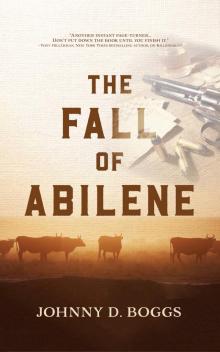 The Fall of Abilene
The Fall of Abilene A Thousand Texas Longhorns
A Thousand Texas Longhorns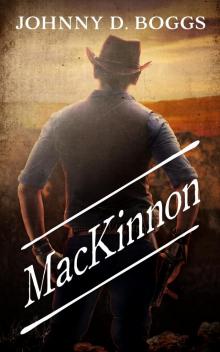 MacKinnon
MacKinnon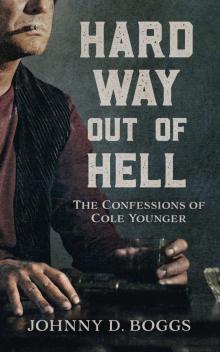 Hard Way Out of Hell
Hard Way Out of Hell Buckskin, Bloomers, and Me
Buckskin, Bloomers, and Me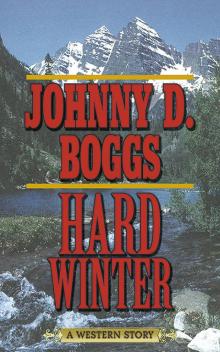 Hard Winter
Hard Winter Wreaths of Glory
Wreaths of Glory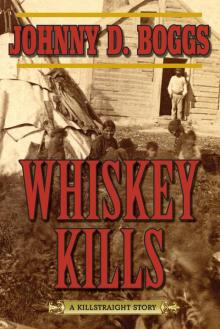 Whiskey Kills
Whiskey Kills Doubtful Canon
Doubtful Canon West Texas Kill
West Texas Kill The Killing Shot
The Killing Shot Greasy Grass
Greasy Grass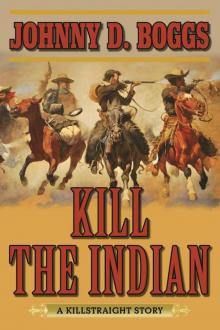 Kill the Indian
Kill the Indian Return to Red River
Return to Red River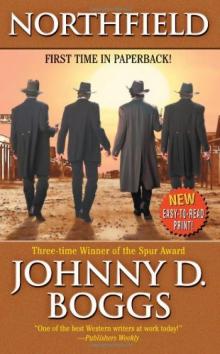 Northfield
Northfield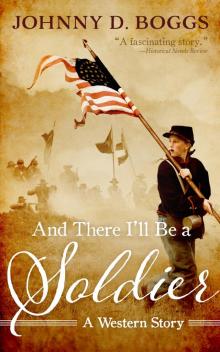 And There I’ll Be a Soldier
And There I’ll Be a Soldier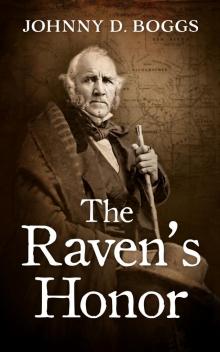 The Raven's Honor
The Raven's Honor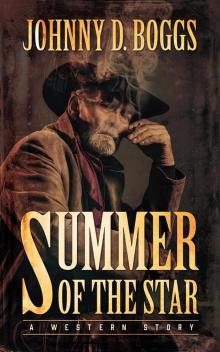 Summer of the Star
Summer of the Star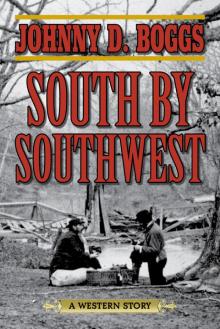 South by Southwest
South by Southwest Mojave
Mojave Valley of Fire
Valley of Fire The Cane Creek Regulators
The Cane Creek Regulators